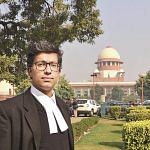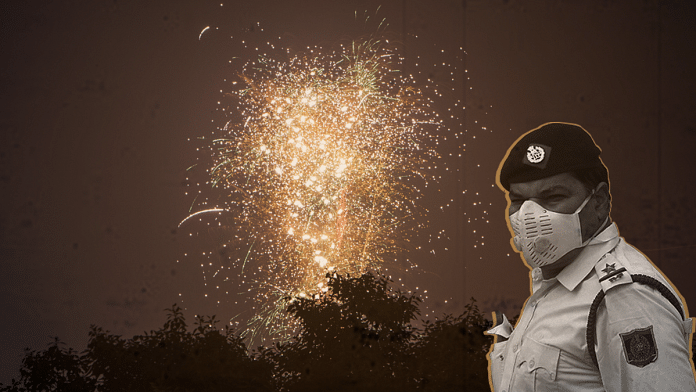The morning after Diwali, Delhi-NCR’s air quality was “hazardous”. The Supreme Court had allowed bursting of green crackers between 8 pm and 10 pm. But the court’s orders were flouted and people were seen bursting crackers way past midnight.
ThePrint asks – SC cracker ban fails: Can legal diktats alter cultural habits or did police not do enough?
Impossible to put all violators behind bars but token persecution was necessary
 Maxwell Pereira
Maxwell Pereira
Retd Joint Police Commissioner, Delhi
The SC ruling to ban firecrackers was well publicised by the media. But was it emphasised enough by the government? For them, Ayodhya and Ram Mandir are the only issues worth being prioritised. Why is public health being neglected? Despite the SC order, there was little to no attention given to it by the government.
An equally important stakeholder responsible for this neglect is the people themselves. We are so accustomed to violating rules that we have become compulsive violators. Even when I was the chief of traffic police, I could see so many people flouting the rules and saying “it’s only a tiny thing”—not realising that it is these supposedly tiny things which cost people their lives.
The foolhardy order of the Supreme Court making the SHOs responsible for any flouting must also be criticised. The SHOs were made responsible, but were they given any help to execute the order? Moreover, the SHOs also didn’t execute any token persecution. It’s impossible to put all violators behind bars, but a token persecution, merely to make an example of it, was necessary. There is no way to hold the SHOs accountable. The entire police system will be destabilised, and no one wants that.
We are the most hypocritical and selfish lot of individuals. So many members of Parliament have a criminal background and are still making laws for us. They go around rampantly flouting those very laws they formulate for citizens. Such is the state of affairs.
SC ruling made a tangible impact, fewer firecrackers were burst
 Sikhil Suri
Sikhil Suri
Advocate, Supreme Court
The Supreme court ruling was extremely balanced in nature. They heard all stakeholders and ensured that it wasn’t a hurried judgement. They marked a balance between right to life and right to practicing cultural traditions, and it needs to be commended. Ultimately, it comes down to the implementation of the ruling.
There was definitely a marked improvement in the sheer magnitude of firecrackers burst this time around.
Wherever one saw a police patrol, bursting would be controlled. The SHOs seem to have done the best they could, given how the ruling came close to Diwali as well. PCR vans travelling through the city, directives issued by the RWAs are all moves that must be appreciated. We are a huge country with limited resources. These monumental changes don’t occur through one day. They take time. We can surely hope that next time around, fewer firecrackers will be burst.
Everyone must take comfort in the fact there was significant improvement this time around. This shows that judiciary’s ruling had a tangible impact. Even if the ruling was issued two months in advance and not this close to Diwali, we may still have faced similar issues. We must have a positive approach going ahead and be assured that the situation will only get better with each Diwali.
One can only wonder what makes Indians believe their lungs are made of steel
 Barun Aggarwal
Barun Aggarwal
Co-founder, Care for air
The air quality has plummeted to ‘hazardous’ levels in Delhi, and the air quality index (AQI) hit 999 in several parts of the city. In fact, in certain areas, it is as high as 2,000. This is nothing less than a national health emergency. We need our government agencies to take note of this. We need our Prime Minister to acknowledge it. What is certain is that this isn’t just a matter of firecrackers being burst during Diwali. Industrial air pollution, waste burning, stubble burning, automobile pollution and many such issues are collectively responsible for what we are witnessing today. There has to be a consistent effort made to fix this.
One can only wonder what makes Indians believe their lungs are supreme and made of steel, and won’t get affected. Until 70 per cent of our lungs are destroyed, some of us may not even realise how it affects us on a daily basis. Social change is, of course, desirable, but we cannot possibly wait for each Indian’s health to be personally impacted before we achieve something.
It is obvious that the SC ruling has been flouted rather unabashedly. We heard of innumerable instances where families went up to the SHO yesterday flagging the cracker bursting in their respective areas, and all the SHOs did was shrug their shoulders. The judiciary did its bit by issuing such an important ruling before Diwali. But the law enforcement agencies failed. They must now be brought to book for their failure. They had all the necessary tools to implement the ruling, but did not. We need law enforcers to support our lawmakers and the judiciary—the three hands of democracy need to work together for us to see any tangible change.
Patchy enforcement of firecrackers ban is clear proof that SC can’t take its authority for granted
 Satya Prasoon
Satya Prasoon
Lawyer and researcher, Centre for Law and Policy Research
Patchy enforcement of SC-mandated ban on firecrackers this Diwali is clear proof that the apex court cannot take its authority for granted, and often legal orders, while necessary, will not be sufficient by themselves in impeding tradition.
It is surprising, however, that the SC, an astute observer and actor in India’s politics, would need such a reminder at all. A patchy follow-up was assured the moment the court qualified its orders by being generous to “green crackers” and allowing a two-hour window for fireworks.
The conditional and confusing nature of the order emboldened the possibilities for its violation. Anyone who knows anything about judicial enforcement knows that orders have to be clear, specific and impose a heavy cost for its violation. None of this was possible at the last moment through an order that was clearly struggling to grasp with the science and logic behind its commandments. This is a reminder for another urgent issue: The need for the SC to anticipate such problems in advance, and use its Article 142 jurisdiction to communicate the cost of non-implementation to state agencies. Its efforts to be imaginative and nuanced about science have landed us in this soup. Both this and the evolving Sabarimala and Aadhaar fiasco should serve as a warning to the SC that it urgently needs to look beyond its obsession with judgment and orders, and focus on creative and effective strategies of strict compliance.
Not adhering to rules seems to be a Delhi-specific problem
 Gopal Sankaranarayanan
Gopal Sankaranarayanan
Advocate, Supreme Court
The SC order was adhered by and followed to a great extent across the country. Almost all cities in the west and the south had a much better Diwali week this year than previous ones because of the limits on timings as well as police regulation. As far as Delhi is concerned, people showed that they are willing to risk their children’s health for a few hours of toxic celebration.
Apparently, not adhering to rules seems to be a Delhi-specific problem.
The police commissioner of the city should be held responsible for allowing this to happen after the SC had specifically directed him to ensure only green crackers would be sold or burst. All the SHOs can’t be held guilty of contempt of court, which is why the commissioner who represented them in court should be held responsible.
The roadmap ahead is clear and specific. The authorities need to ensure that manufacture of the firecrackers comes to a complete halt.
By Fatima Khan, journalist at ThePrint. You can follow her on twitter @khanthefatima.




Yes…it is right
The flaw in the Court order is it fails to bring the Govt agencies involved from licencing to retailing the goods in discussion to book. once the goods are sold and they are with people no amount of force implement the practice. For that that matter Courts should be sensible enough to cover the Political connection in boosting the unwanted social practice also and to subvert this they should adopt comprehensive approach in dealing with such matters. It is time to enforce ethical practise on Polity and the Govt Agencies that are hand in glove in restricting the overall growth of the country through Unethical practices.
What can the police do if the 1.3 billion Indians break the law? What if 1.3 billion Indians refuse to follow supreme court’s orders? People have flipped the bird at SC saying do what ever you want, we are like this only.
We have had fewer crackers being burnt this year in our neighbourhood. Not all laws or judgments of the SC are equally profound, inviolable. It was not the apex court’s desire to see violators in jail on such a joyous occasion or that the police should leave all other important tasks and enforce this ban. The Court has prescribed a norm which people should willingly, voluntarily respect, because it is so evidently in their interest to do so.
I agree with the above view. If people did not comply with the Supreme Court order, it should not be seen as a failure of the order or of the Supreme Court or the police. It should be seen as a failure of the people. How can we assume that we are a lawless lot and will make any change of habit only out of fear of punishment and not out of its logic for our own good? On that assumption we have no right to be a free country.